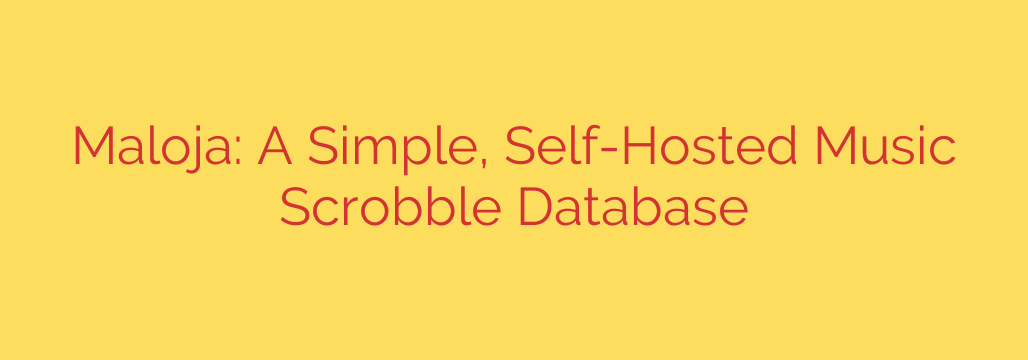
Own Your Music History: A Guide to Self-Hosted Scrobbling
In an age where every click, view, and listen is tracked by large corporations, taking control of your personal data has become more important than ever. Your music listening history is a deeply personal dataset—it’s the soundtrack to your life, reflecting your moods, memories, and moments. While services like Last.fm have long offered a way to track these “scrobbles,” they require you to hand over your data to a third party.
What if you could have all the benefits of music scrobbling without sacrificing your privacy? Enter the world of self-hosting. By running your own scrobble database, you can build a permanent, private archive of your listening habits that you alone control. A standout tool in this space is Maloja, a simple and efficient server designed to do one thing perfectly: collect your music history.
The Power of Owning Your Listening Data
Before diving into the specifics, it’s important to understand why you would want to self-host your scrobbles. The advantages are significant for anyone who values privacy and data ownership.
- Complete Privacy: When you host your own scrobbling service, your listening data never leaves your server. There are no third parties analyzing your habits, selling your data to advertisers, or using it to build profiles on you. It’s your music, your data, your business.
- Total Data Ownership: The database of your listening history belongs entirely to you. You can export it, analyze it, create your own visualizations, or migrate it to another system whenever you choose. You are never locked into a proprietary ecosystem.
- Longevity and Control: Commercial services can change their terms, introduce fees, or shut down entirely, potentially taking your years of listening history with them. A self-hosted solution will exist as long as you choose to run it.
- No Ads or Algorithmic Clutter: Your personal music dashboard is just that—yours. It exists to show you your stats, not to serve you ads or push recommendations you didn’t ask for.
Introducing Maloja: A Lightweight Scrobble Server
Maloja is a self-hosted application that acts as a personal music scrobble database. It’s built on a philosophy of simplicity and efficiency, making it an ideal choice for both beginners and experienced self-hosters.
At its core, Maloja is designed to be a “drop-in” replacement for the backend of services like Last.fm or Libre.fm. This is its most powerful feature. Most popular music players and services (like Plex, Jellyfin, foobar2000, and many mobile apps) already have built-in support for scrobbling to the Last.fm API. Maloja cleverly emulates this API, allowing you to simply point your existing music players to your own server address.
Key features that make Maloja stand out include:
- Broad Compatibility: Because it uses the widely supported Last.fm API, you don’t need special clients or plugins. If your music player can scrobble to Last.fm, it can almost certainly scrobble to your Maloja instance.
- Lightweight and Simple: Maloja is designed to run efficiently on low-power hardware, such as a Raspberry Pi or a small Virtual Private Server (VPS). It doesn’t require a complex database like PostgreSQL or MySQL; instead, it stores your data in a straightforward, easy-to-manage format.
- Clean Web Interface: While the primary function is data collection, Maloja provides a clean, minimalist web interface. You can view your listening history, see charts of your top artists and tracks, and get a clear overview of your musical journey over time.
How It Works and Getting Started
The concept is straightforward. You set up the Maloja server on a machine you control. Then, in your music player’s settings, you replace the standard Last.fm API URL with the URL of your Maloja instance and provide your Maloja credentials. From that point on, every track you play is sent to your personal server and recorded in your private database.
Actionable Security Tip: If you plan to access your scrobble server from outside your home network (for example, from a mobile app while you’re on the go), it is crucial to secure it properly. Do not expose it directly to the internet. Instead, use a reverse proxy like Nginx, Caddy, or Traefik. A reverse proxy can handle SSL/TLS encryption for you, ensuring that the connection between your music player and your server is secure (HTTPS). This is a standard best practice for all self-hosted services.
Take Control of Your Soundtrack
Self-hosting your music scrobbles is a powerful step toward digital independence. It allows you to enjoy the fun and insight of tracking your listening history without compromising your privacy. Tools like Maloja make this process accessible, providing a reliable and private home for the soundtrack of your life. By investing a little time into setting up your own scrobble server, you become the true curator and owner of your personal music archive.
Source: https://www.linuxlinks.com/maloja-simple-self-hosted-music-scrobble-database/








